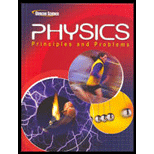
Concept explainers
a.
The MA of the given pulley if a force of
a.
Answer to Problem 71A
Explanation of Solution
Given:
The mass that is to be lifted,
The distance by which the mass is lifted,
The distance by which the rope is pulled,
The force exerted,
Formula used:
The mechanical advantage of a system is given by,
Where
Calculation:
The weight of the mass,
Using the given values, MA of the given pulley system can be calculated as,
Conclusion:
Thus, MA of the given pulley is
b.
The IMA of the given pulley if a force of
b.
Answer to Problem 71A
Explanation of Solution
Given:
The mass that is to be lifted,
The distance by which the mass is lifted,
The distance by which the rope is pulled,
The force exerted,
Formula used:
The idea mechanical advantage is the ratio of the distances moved,
Where
Calculation:
Using the given values, IMA of the given pulley system can be calculated as,
Conclusion:
Thus, IMA of the given pulley is
c.
The efficiency of the given pulley if a force of
c.
Answer to Problem 71A
Explanation of Solution
Given:
The mass that is to be lifted,
The distance by which the mass is lifted,
The distance by which the rope is pulled,
The force exerted,
From part (a),
From part (b),
Formula used:
The efficiency of a machine is the ratio of mechanical advantage and ideal mechanical advantages,
Calculation:
Using the given values in above, the efficiency of the given pulley can be calculated as,
Conclusion:
Thus, the efficiency of the given pulley is
Chapter 10 Solutions
Glencoe Physics: Principles and Problems, Student Edition
Additional Science Textbook Solutions
College Physics: A Strategic Approach (3rd Edition)
Anatomy & Physiology (6th Edition)
Chemistry
Genetic Analysis: An Integrated Approach (3rd Edition)
Organic Chemistry (8th Edition)
Human Anatomy & Physiology (2nd Edition)
- A particle with a charge of − 5.20 nC is moving in a uniform magnetic field of (B→=−( 1.22 T )k^. The magnetic force on the particle is measured to be(F→=−( 3.50×10−7 N )i^+( 7.60×10−7 N )j^. Calculate the scalar product v→F→. Work the problem out symbolically first, then plug in numbers after you've simplified the symbolic expression.arrow_forwardNeed help wity equilibrium qestionarrow_forwardneed answer asap please thanks youarrow_forward
- A man slides two boxes up a slope. The two boxes A and B have a mass of 75 kg and 50 kg, respectively. (a) Draw the free body diagram (FBD) of the two crates. (b) Determine the tension in the cable that the man must exert to cause imminent movement from rest of the two boxes. Static friction coefficient USA = 0.25 HSB = 0.35 Kinetic friction coefficient HkA = 0.20 HkB = 0.25 M₁ = 75 kg MB = 50 kg P 35° Figure 3 B 200arrow_forwardA golf ball is struck with a velocity of 20 m/s at point A as shown below (Figure 4). (a) Determine the distance "d" and the time of flight from A to B; (b) Determine the magnitude and the direction of the speed at which the ball strikes the ground at B. 10° V₁ = 20m/s 35º Figure 4 d Barrow_forwardThe rectangular loop of wire shown in the figure (Figure 1) has a mass of 0.18 g per centimeter of length and is pivoted about side ab on a frictionless axis. The current in the wire is 8.5 A in the direction shown. Find the magnitude of the magnetic field parallel to the y-axis that will cause the loop to swing up until its plane makes an angle of 30.0 ∘ with the yz-plane. Find the direction of the magnetic field parallel to the y-axis that will cause the loop to swing up until its plane makes an angle of 30.0 ∘ with the yz-plane.arrow_forward
- A particle with a charge of − 5.20 nC is moving in a uniform magnetic field of (B→=−( 1.22 T )k^. The magnetic force on the particle is measured to be (F→=−( 3.50×10−7 N )i^+( 7.60×10−7 N )j^. Calculate the y and z component of the velocity of the particle.arrow_forwardneed answer asap please thank youarrow_forward3. a. Determine the potential difference between points A and B. b. Why does point A have a higher potential energy? Q = +1.0 C 3.2 cm 4.8 cm Aarrow_forward
 College PhysicsPhysicsISBN:9781305952300Author:Raymond A. Serway, Chris VuillePublisher:Cengage Learning
College PhysicsPhysicsISBN:9781305952300Author:Raymond A. Serway, Chris VuillePublisher:Cengage Learning University Physics (14th Edition)PhysicsISBN:9780133969290Author:Hugh D. Young, Roger A. FreedmanPublisher:PEARSON
University Physics (14th Edition)PhysicsISBN:9780133969290Author:Hugh D. Young, Roger A. FreedmanPublisher:PEARSON Introduction To Quantum MechanicsPhysicsISBN:9781107189638Author:Griffiths, David J., Schroeter, Darrell F.Publisher:Cambridge University Press
Introduction To Quantum MechanicsPhysicsISBN:9781107189638Author:Griffiths, David J., Schroeter, Darrell F.Publisher:Cambridge University Press Physics for Scientists and EngineersPhysicsISBN:9781337553278Author:Raymond A. Serway, John W. JewettPublisher:Cengage Learning
Physics for Scientists and EngineersPhysicsISBN:9781337553278Author:Raymond A. Serway, John W. JewettPublisher:Cengage Learning Lecture- Tutorials for Introductory AstronomyPhysicsISBN:9780321820464Author:Edward E. Prather, Tim P. Slater, Jeff P. Adams, Gina BrissendenPublisher:Addison-Wesley
Lecture- Tutorials for Introductory AstronomyPhysicsISBN:9780321820464Author:Edward E. Prather, Tim P. Slater, Jeff P. Adams, Gina BrissendenPublisher:Addison-Wesley College Physics: A Strategic Approach (4th Editio...PhysicsISBN:9780134609034Author:Randall D. Knight (Professor Emeritus), Brian Jones, Stuart FieldPublisher:PEARSON
College Physics: A Strategic Approach (4th Editio...PhysicsISBN:9780134609034Author:Randall D. Knight (Professor Emeritus), Brian Jones, Stuart FieldPublisher:PEARSON





